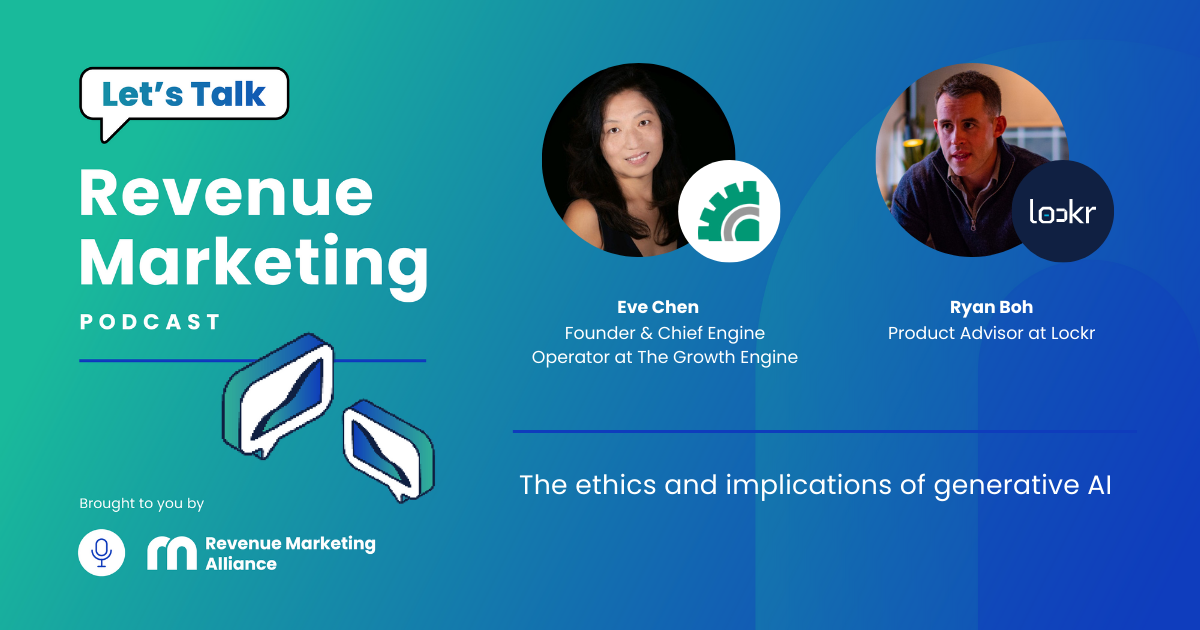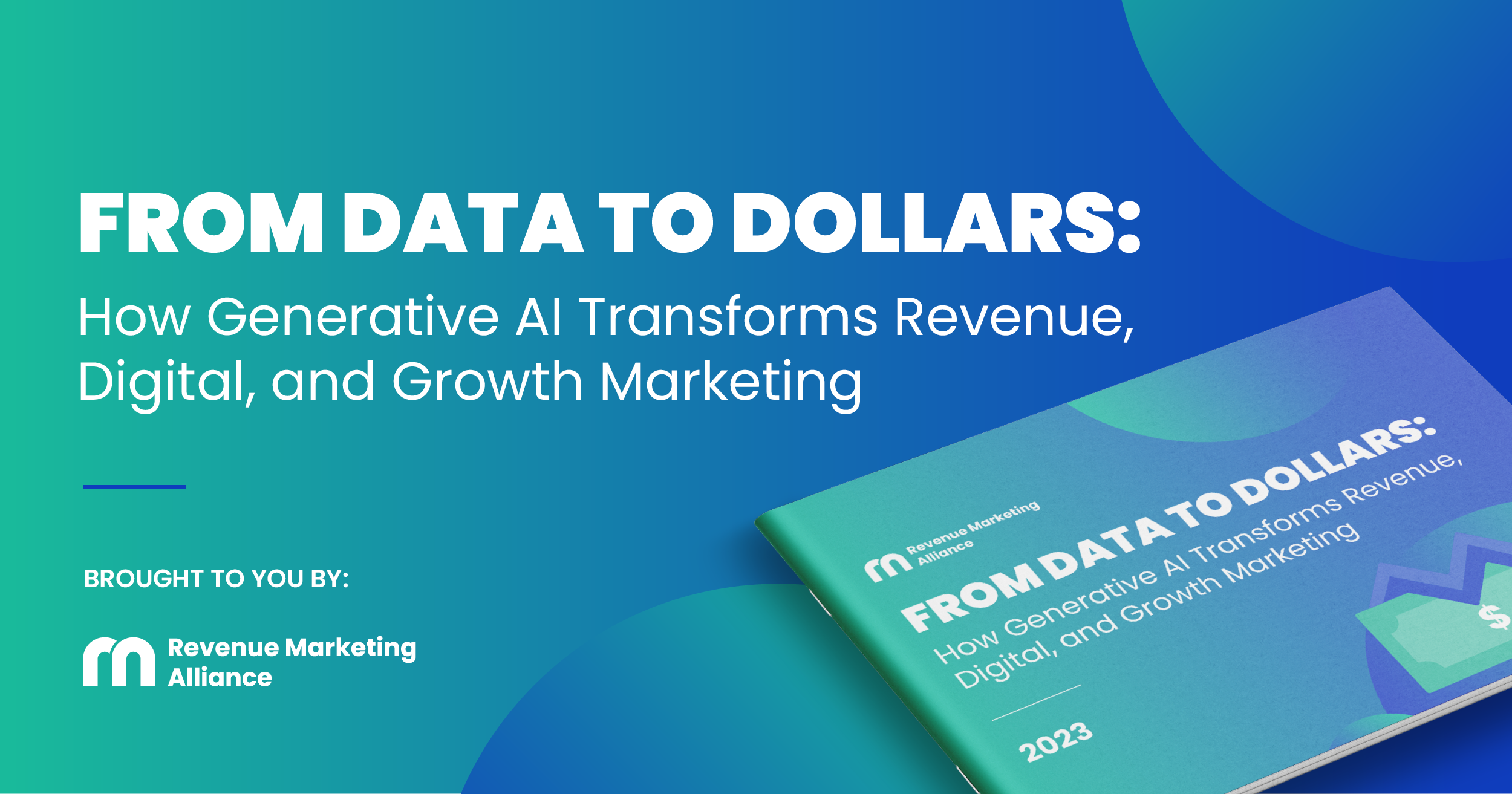There’s a lot on the plates of revenue marketers these days. Team leaders are looking to cultivate well-rounded marketers, meet the expectations of leadership teams, keep clients happy, and stay ahead of what’s next when it comes to technology and innovation.
With so much at stake, artificial intelligence (AI) is reshaping traditional marketing tactics and creating new opportunities – and challenges – when it comes to revenue marketing.
What’s making the biggest wave in the wider world of AI? Generative AI (GenAI). GenAI is a particular AI tool that can generate text, images, and videos based on patterns and data it has been trained on, and it’s reshaping the content creation landscape.
When properly prompted (which takes a lot of training and practice), a generative AI tool is capable of drafting ad copy, developing blog posts, summarizing meeting notes, iterating on concepts, and even producing audio and video content.

By analyzing data and following patterns, GenAI can produce creative content at an unprecedented scale, offering boosts in productivity, efficiency, and scalability. It promises to improve marketing outcomes and campaign performance while enhancing personalization and customer engagement.
This article explores the rise of GenAI in marketing and its implications for revenue marketers, with a particular focus on whether it can really stand up to what sounds like too-good-to-be-true claims.
Content creation and personalization
GenAI has been transformative in content creation by speeding the process of iterative and short-form content that is turning traditional content creation timelines upside down.
That next-level speed comes with some shortcomings though, as GenAI content still struggles to keep up with expert copywriters when it comes to creativity and storytelling, which remain the backbone of smart marketing strategies for companies of all sizes. Still, GenAI is paving the way for particular wins when it comes to better targeting.
Today's customers expect personalized experiences, a fact supported by a 2018 Epsilon survey, which found that 80% of consumers are more likely to purchase from a brand that offers personalized experiences (Epsilon, 2018).
With GenAI, real-time customization based on individual preferences and behavior becomes a reality, enabling brands to interact with their consumers in a highly personalized manner. Revenue marketers can leverage GenAI to tailor messages to individual needs and preferences, significantly improving the customer experience.
Improved marketing outcomes
GenAI can analyze massive volumes of data, identifying patterns that humans may overlook. This capability is of immense value in marketing strategy and measurement, answering data queries, democratizing data access, and bringing exciting opportunities to uncover new insights from marketing performance data.
With GenAI, revenue marketers can continuously optimize their campaigns, leading to improved marketing outcomes. Automated processes enabled by AI can streamline workflow, freeing up marketers to focus on strategy and creative work.
Another of AI's key strengths lies in its predictive analysis capabilities. By analyzing historical data, AI can make increasingly accurate estimates of leads' potential to convert. This offers revenue marketers an unprecedented opportunity to create more impactful marketing, ensuring they're focusing on the most promising leads.
By leveraging the data functionality of AI tools, you can make data-backed decisions that inform your marketing strategies and improve your immediate and long-term outcomes.

Challenges and mitigation
While GenAI offers significant benefits, it also comes with a fair number of challenges. The quality of training, for example, is crucial. Poor data quality can result in inaccurate outputs and introduce biases and errors in training data. According to IBM, poor data quality can cost businesses up to $3.1 trillion annually (IBM, 2016).
Inaccurate data might lead to incorrect outputs, introducing biases and errors in marketing campaigns. These are of major concern, particularly for businesses working in highly regulated industries like finance, government, and healthcare. The best minds in AI are working around the clock to come up with solutions that keep inputs and outputs safe and compliant.
Ethical concerns are also prevalent. AI-generated content poses potential ethical issues when it comes to everything from replicating biased input to the question of who owns AI-created content.
Ensuring responsible and respectful use of generative AI is essential, but most marketers can breathe a sigh of relief by remembering that GenAI, unlike humans, still struggles with real acts of creativity and originality, which means that human intervention remains a critical part of creating truly innovative and impactful content that engages with our audiences on an emotional level.

Mitigating the risks that come with the implementation of Gen AI requires the implementation of strong fact-checking and editing standards, and clearly defined processes to keep those standards consistently applied across your organization.
Businesses can use GenAI trained specifically for enterprise use cases and establish guidelines for its appropriate use, which goes a long way to mitigate some of the challenges presented here.
Future trends
Looking ahead, GenAI presents exciting opportunities in marketing and the amount of research and funding going into GenAI advancement will guarantee new features and functionality at an incredible pace.
According to research, 37% of organizations have implemented AI in some form, a number that has grown by 270% over the past four years (Gartner, 2019). As organizations continue to find ways to overcome the challenges, and are reporting back on wins driven by AI, those numbers will only get higher. What do the wins really look like?
According to one study, marketers have reported a positive impact of 6.2% on sales and 7% on customer satisfaction from AI (Duke University, 2023). Another study shows that businesses investing in AI are experiencing a 3-15% revenue increase and a 10-20% uplift in sales ROI (McKinsey, 2023). In other words, AI tools are driving tangible results for marketing teams right now.
From personalizing content creation and transforming marketing into interactive and immersive experiences, to precision-targeting specific audience segments with tailored content and messaging, the potential for GenAI is worth exploring for any revenue marketer.
If you haven’t had the chance to get familiar with it yet, now is the time to start seeking out training opportunities to sharpen your skills and decide where to leverage AI in your own marketing.
Conclusion
The rise of AI isn’t just a trend; it’s a fundamental shift in the way we do business and will be a non-negotiable part of smarter team leadership and growth. As GenAI continues to evolve, its influence on marketing will only become more significant.
Embracing GenAI can enhance marketing capabilities and drive better outcomes, allowing revenue marketers to streamline their operations, personalize their marketing efforts, and make data-driven decisions that drive revenue growth. Just don’t forget to make space – in the budget and on your team – for risk mitigation plans that establish and maintain governance guidelines for responsible use.
If all of this talk about artificial intelligence has you or your team feeling a little jumpy, you can relax. While GenAI is here to stay, human creativity and strategic oversight are still vital to great marketing results.
GenAI isn’t here to replace you or your teams. Instead, it’s a powerful co-pilot to help revenue marketers navigate the future with more efficiency and more time to focus on big ideas.
While AI is transforming the marketing landscape, the success of your AI-powered marketing efforts will depend not only on how well you leverage AI but also on how well you balance it with a genuine, empathetic understanding of your customers' needs and desires.
As we move forward, those who embrace this technology as another tool in the marketing toolbox will be better positioned for growth.
Want to learn more about how AI transforms revenue, digital, and growth marketing?
Our free eBook will help you understand the potential of generative AI in driving revenue and optimizing your marketing efforts.
Inside, you’ll find actionable insights from a wealth of sources, including industry experts with extensive experience and knowledge in generative AI.
🤖 Understanding generative AI
🫂 Leveraging AI for audience segmentation and personalization
📈 Enhancing customer journey and conversion rates
🔎 Predictive analytics and forecasting
✍️ Implementing generative AI in revenue marketing
Download your copy today to get started with proven techniques and cutting-edge strategies to inject high-octane AI into your marketing arsenal. 👇



